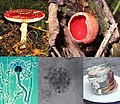Penicillium roqueforti is a common saprotrophic fungus in the genus Penicillium. Widespread in nature, it can be isolated from soil, decaying organic...
18 KB (1,950 words) - 19:31, 22 December 2024
Blue cheese (section Penicillium roqueforti inoculum)
methods involve the use of a freeze-dried Penicillium roqueforti culture. Although Penicillium roqueforti can be found naturally, cheese producers nowadays...
28 KB (3,227 words) - 02:14, 25 November 2024
blue cheese. Penicillium camemberti and Penicillium roqueforti are the molds on Camembert, Brie, Roquefort, and many other cheeses. Penicillium nalgiovense...
24 KB (2,388 words) - 15:36, 22 November 2024
Montbrison, Lanark Blue, Roquefort, Shropshire Blue, and Stilton use Penicillium roqueforti.) In 1874, Sir William Roberts, a physician from Manchester, noted...
2 KB (222 words) - 04:56, 19 April 2024
is an English cheese, produced in two varieties: blue, which has Penicillium roqueforti added to generate a characteristic smell and taste, and white, which...
25 KB (2,552 words) - 13:57, 30 December 2024
ran to meet her. When he returned a few months later, the mold (Penicillium roqueforti) had transformed his plain cheese into Roquefort. In 79 AD, Pliny...
12 KB (1,293 words) - 12:57, 17 December 2024
Penicillium carneum is a fungus species of the genus of Penicillium. Penicillium roqueforti var. carneum was reclassified to Penicillium carneum. P. carneum...
3 KB (204 words) - 22:22, 16 January 2024
blue brie. It is made from a combination of Penicillium camemberti and the same blue Penicillium roqueforti mould used to make Gorgonzola, Roquefort, and...
2 KB (208 words) - 19:07, 16 September 2023
Roquefortine C (category Penicillium)
particularly species from the genus Penicillium. It was first isolated from a strain of Penicillium roqueforti, a species commercially used as a source...
7 KB (566 words) - 20:24, 29 January 2023
Deuterolysin (redirect from Penicillium roqueforti protease II)
24.39, Penicillium roqueforti protease II, microbial neutral proteinase II, acid metalloproteinase, neutral proteinase II, Penicillium roqueforti metalloproteinase)...
2 KB (245 words) - 13:48, 26 August 2023
used in the production of blue cheese, in addition to the mold Penicillium roqueforti. Its aroma also attracts mosquitoes. The first comprehensive proteomic...
4 KB (286 words) - 15:03, 7 August 2024
Roquefort toxin (PR toxin) is a mycotoxin produced by the fungus Penicillium roqueforti. In 1973, PR toxin was first partially characterized by isolating...
12 KB (1,397 words) - 16:29, 13 December 2024
So-called blue cheese is created by inoculating a cheese with Penicillium roqueforti or Penicillium glaucum. This is done while the cheese is still in the form...
25 KB (2,774 words) - 07:13, 5 January 2025
culture obtained from cottonseed. Aside from P. roqueforti, P. commune is the only other Penicillium species known to produce roquefortine. The cottonseed...
15 KB (1,584 words) - 22:54, 10 January 2024
narrow cylindrical shape. The semi-hard cheese is inoculated with Penicillium roqueforti spores and aged for at least 28 days. Almost identical to Fourme...
3 KB (244 words) - 12:04, 22 August 2024
Penicillium robsamsonii Penicillium rolfsii Penicillium roqueforti Penicillium roseopurpureum Penicillium rubefaciens Penicillium rubens Penicillium rubidurum...
39 KB (2,221 words) - 15:25, 11 May 2024
needed] use a weaker form of mold, Penicillium glaucum, to create the blue veins, rather than the Penicillium roqueforti used in Roquefort and other blue...
4 KB (365 words) - 11:15, 21 August 2024
department of Aveyron, where it must be seeded with mold spores (Penicillium roqueforti) prepared from traditional strains endemic to these same cellars...
9 KB (747 words) - 07:27, 25 November 2024
such as Stilton or Roquefort, which are made by inoculation with Penicillium roqueforti. Molds used in cheese production are non-toxic and are thus safe...
203 KB (19,382 words) - 14:33, 2 January 2025
Enzymes of Penicillium camemberti play a role in the manufacture of the cheeses Camembert and Brie, while those of Penicillium roqueforti do the same...
54 KB (6,675 words) - 23:37, 28 October 2024
rods are used to pierce the formed curds to distribute the mould (Penicillium roqueforti) evenly through the cheese. The holes can still be seen when the...
3 KB (300 words) - 16:39, 29 December 2024
Penicillopepsin (redirect from Penicillium roqueforti acid proteinase)
proteinase, Penicillium caseicolum aspartic proteinase, Penicillium roqueforti acid proteinase, Penicillium duponti aspartic proteinase, Penicillium citrinum...
3 KB (288 words) - 03:10, 22 June 2024
colour comes from the addition of annatto, a natural food colouring. Penicillium roqueforti produces the veining. The cheese has a deep orange-brown, natural...
3 KB (343 words) - 16:06, 12 April 2024
unskimmed cow's milk and cream, with injected culture of the mold Penicillium roqueforti. The name Kraftkar ("strongman") relates to the legendary farmhand...
3 KB (238 words) - 07:13, 11 September 2024
Habrylo, O.; Barbier, G. (31 March 2010). "Quantification of Penicillium camemberti and P. roqueforti mycelium by real-time PCR to assess their growth dynamics...
11 KB (1,211 words) - 09:08, 4 December 2024
the Aveyron region of France, where it is colonised by the fungus Penicillium roqueforti that grows in these caves. Due to the horizontal and exhaustive...
46 KB (5,382 words) - 05:04, 5 November 2024
acid is a mycotoxin that is produced by Aspergillus flavus and Penicillium roqueforti mold. It is not a product of acid degradation of penicillin. Its...
1 KB (74 words) - 13:03, 25 November 2024
region in what is now France and Switzerland. During production, Penicillium roqueforti mold is introduced and the unwashed curds are loosely packed. It...
3 KB (237 words) - 16:16, 3 July 2024
Other Secondary Metabolites Produced in Vitro by Penicillium paneum Frisvad and Penicillium roqueforti Thom Isolated from Baled Grass Silage in Ireland"...
5 KB (459 words) - 22:22, 16 January 2024
ewe's milk cheeses produced in Britain since the Middle Ages. Using Penicillium roqueforti, to create the veining, it has a strong flavour that varies according...
2 KB (117 words) - 09:16, 3 October 2024























